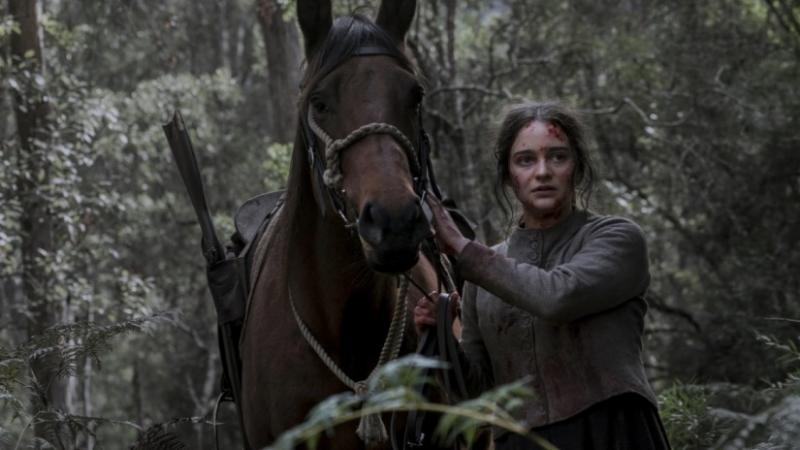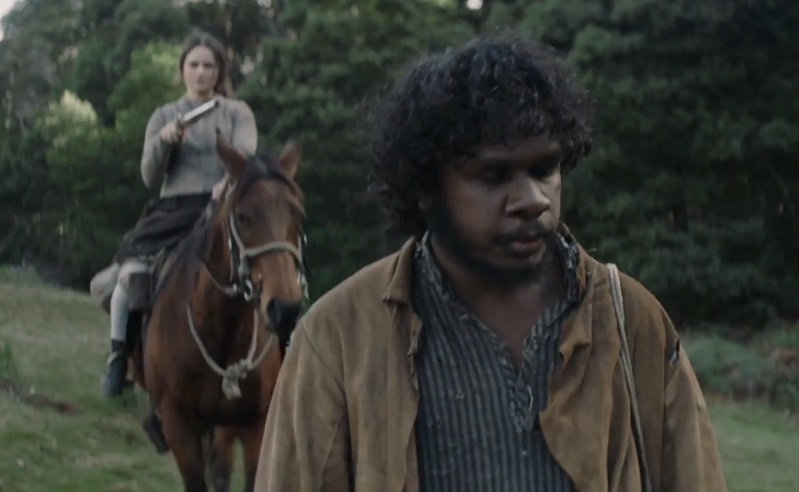The Nightingale review – revenge without redemption | reviews, news & interviews
The Nightingale review – revenge without redemption
The Nightingale review – revenge without redemption
Colonial tragedy set in 19th-century Tasmania misses the mark

Writer-director Jennifer Kent knows that Australia’s colonial past shouldn’t be beautified, and she drives that fact home in every gloom-drenched shot of The Nightingale (her second feature after The Babadook from 2014).
Set in 1825 during the genocidal British colonial rule in Tasmania, the film follows Irish convict Clare (Aisling Franciosi) who launches a personal revenge mission against the colossally sinister Lieutenant Hawkins (Sam Claflin). Within the opening 15 minutes of the film, Hawkins rapes Clare twice, oversees a third, shoots her defenseless husband at point blank range, and allows a fellow officer to murder her infant daughter.
Suffering begets suffering in this squalid swamp of too-long-ignored history. After the horrific opening, Kent introduces the theme of Indigenous slaughter. As Clare sets off to hunt down Hawkins, she meets an Indigenous man named Billy (Baykali Ganambarr). Riding on horseback with rifle in hand, Clare is framed as the type of oppressor she wishes to destroy. A clever ambiguity arises: can Clare, herself a member of the colonial forces, though a marginalised victim of it, contribute to its impact? Answering that question, we might be able to confront the second ambiguity: does Clare enlist Billy’s services (“teams up with”, as one reviewer has phrased it) or abduct and enslave him?
 The range of historical scope Kent attempts is huge and original. Urgent, too, for a nation that has still not ceded land to its original owners. Sadly, the film does not probe any of these political issues with any intensity, instead favouring plot drama and aesthetic frills. Rape reappears in callous cutaways solely to reassert what was always known: that Hawkins is unpardonably evil. The script misses the mark here. By gratuitously cartooning Hawkins and his men, the reality of their horror slips away. The result of this is significant for Clare, and for the film's polemic. Hawkins’ eventual downfall is not a hard won victory because he’s become so one-dimensional.
The range of historical scope Kent attempts is huge and original. Urgent, too, for a nation that has still not ceded land to its original owners. Sadly, the film does not probe any of these political issues with any intensity, instead favouring plot drama and aesthetic frills. Rape reappears in callous cutaways solely to reassert what was always known: that Hawkins is unpardonably evil. The script misses the mark here. By gratuitously cartooning Hawkins and his men, the reality of their horror slips away. The result of this is significant for Clare, and for the film's polemic. Hawkins’ eventual downfall is not a hard won victory because he’s become so one-dimensional.
Aisling Franciosi’s performance is seismic. Yet there’s reluctance within the script to honour her power and complexity. Clare continually reiterates states of emotion that were known about her character (“I’m Ireland, I hate the fuckin’ English”). We are taunted by the possibility of nuance or development within Clare’s enigma, but sidetracked into aesthetic embellishment. A device Kent employs is a string of dream sequences, drawing on her demonstrated knack for horror mood and pacing. These moments spook, but betray the hard realism the film had earlier established. Add on the allusions to westerns, and rather than transcending genre, there are too many half-explored ones. Torn through all these shifting modes, Clare’s character is denied resolution – the kind that might be morally necessary given the film’s themes. The final third of the film is a deflatingly incurious rehearsal of revenge genre conventions. There is no genuine – let alone radical – attempt to revise traditional formula.
Whose story is being told? Despite Indigenous elders being consulted during production (a progression of great achievement in filmmaking), the baroque grandeur of Iutruwita, as the land is called in the Indigenous language, functions merely as a backdrop that is disregarded by a narrow Academy screen ratio. Again, form betrays politics. The world is framed through colonial eyes. The Nightingale remains a film of grand intent and ambition, but it just does not soar.
Add comment
The future of Arts Journalism
You can stop theartsdesk.com closing!
We urgently need financing to survive. Our fundraising drive has thus far raised £49,000 but we need to reach £100,000 or we will be forced to close. Please contribute here: https://gofund.me/c3f6033d
And if you can forward this information to anyone who might assist, we’d be grateful.

Subscribe to theartsdesk.com
Thank you for continuing to read our work on theartsdesk.com. For unlimited access to every article in its entirety, including our archive of more than 15,000 pieces, we're asking for £5 per month or £40 per year. We feel it's a very good deal, and hope you do too.
To take a subscription now simply click here.
And if you're looking for that extra gift for a friend or family member, why not treat them to a theartsdesk.com gift subscription?
more Film
 Sorry, Baby review - the healing power of friendship in the aftermath of sexual assault
Eva Victor writes, directs and stars in their endearing debut feature
Sorry, Baby review - the healing power of friendship in the aftermath of sexual assault
Eva Victor writes, directs and stars in their endearing debut feature
 Blu-ray: Who Wants to Kill Jessie?
Fast-paced and visually inventive Czech comedy
Blu-ray: Who Wants to Kill Jessie?
Fast-paced and visually inventive Czech comedy
 Oslo Stories Trilogy: Love review - freed love
Gay cruising offers straight female lessons in a heady ode to urban connection
Oslo Stories Trilogy: Love review - freed love
Gay cruising offers straight female lessons in a heady ode to urban connection
 Beating Hearts review - kiss kiss, slam slam
Romance and clobberings in a so-so French melodrama
Beating Hearts review - kiss kiss, slam slam
Romance and clobberings in a so-so French melodrama
 Materialists review - a misfiring romcom or an undercooked satire?
Writer-director Celine Song's latest can't decide what kind of film it is
Materialists review - a misfiring romcom or an undercooked satire?
Writer-director Celine Song's latest can't decide what kind of film it is
 theartsdesk Q&A: actor Leonie Benesch on playing an overburdened nurse in the Swiss drama 'Late Shift'
The Guildhall-trained German star talks about the enormous pressures placed on nurses and her admiration for British films and TV
theartsdesk Q&A: actor Leonie Benesch on playing an overburdened nurse in the Swiss drama 'Late Shift'
The Guildhall-trained German star talks about the enormous pressures placed on nurses and her admiration for British films and TV
 Freakier Friday review - body-swapping gone ballistic
Lindsay Lohan and Jamie Lee Curtis's comedy sequel jumbles up more than their daughter-mother duo
Freakier Friday review - body-swapping gone ballistic
Lindsay Lohan and Jamie Lee Curtis's comedy sequel jumbles up more than their daughter-mother duo
 Eight Postcards from Utopia review - ads from the era when 1990s Romania embraced capitalism
Radu Jude's documentary is a mad montage of cheesy TV commercials
Eight Postcards from Utopia review - ads from the era when 1990s Romania embraced capitalism
Radu Jude's documentary is a mad montage of cheesy TV commercials
 The Kingdom review - coming of age as the body count rises
A teen belatedly bonds with her mysterious dad in an unflinching Corsican mob drama
The Kingdom review - coming of age as the body count rises
A teen belatedly bonds with her mysterious dad in an unflinching Corsican mob drama
 Weapons review - suffer the children
'Barbarian' follow-up hiply riffs on ancient fears
Weapons review - suffer the children
'Barbarian' follow-up hiply riffs on ancient fears
 theartsdesk Q&A: filmmaker Dag Johan Haugerud on sex, love, and confusion in the modern world
The writer-director discusses first-love agony and ecstasy in 'Dreams', the opening UK installment of his 'Oslo Stories' trilogy
theartsdesk Q&A: filmmaker Dag Johan Haugerud on sex, love, and confusion in the modern world
The writer-director discusses first-love agony and ecstasy in 'Dreams', the opening UK installment of his 'Oslo Stories' trilogy

Comments
What an excellent review of